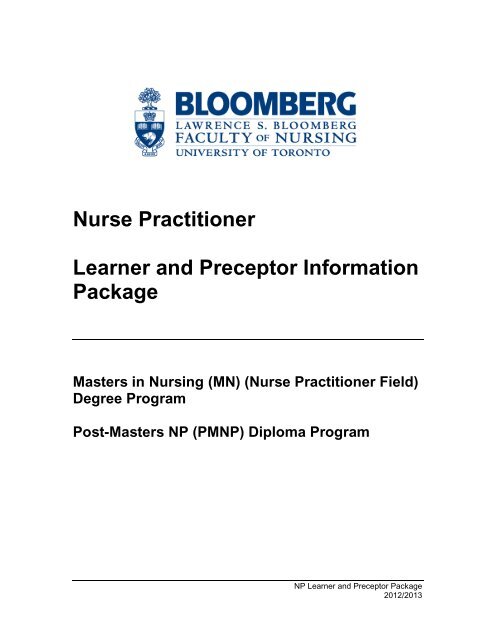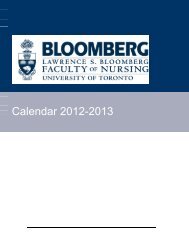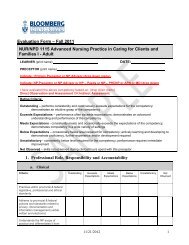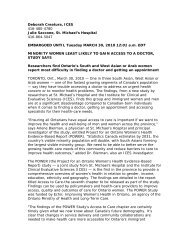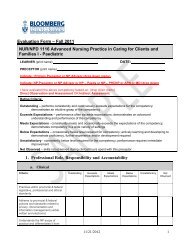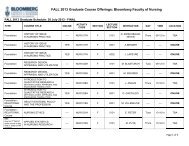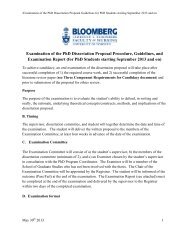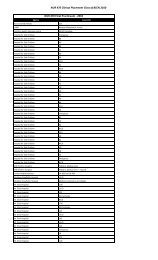Nurse Practitioner Learner and Preceptor Information Package
Nurse Practitioner Learner and Preceptor Information Package
Nurse Practitioner Learner and Preceptor Information Package
You also want an ePaper? Increase the reach of your titles
YUMPU automatically turns print PDFs into web optimized ePapers that Google loves.
1<br />
<strong>Nurse</strong> <strong>Practitioner</strong><br />
<strong>Learner</strong> <strong>and</strong> <strong>Preceptor</strong> <strong>Information</strong><br />
<strong>Package</strong><br />
Masters in Nursing (MN) (<strong>Nurse</strong> <strong>Practitioner</strong> Field)<br />
Degree Program<br />
Post-Masters NP (PMNP) Diploma Program<br />
NP <strong>Learner</strong> <strong>and</strong> <strong>Preceptor</strong> <strong>Package</strong><br />
2012/2013
2<br />
Dear Respected <strong>Preceptor</strong>,<br />
Thank you for agreeing to participate as a preceptor for a student in the <strong>Nurse</strong><br />
<strong>Practitioner</strong> program at the Lawrence S. Bloomberg Faculty of Nursing. The preceptor<br />
role is fundamental to helping the student learn, experience, <strong>and</strong> practice in an environment<br />
that is supportive <strong>and</strong> safe for both the student <strong>and</strong> the patients. We appreciate your time,<br />
your professional commitment, <strong>and</strong> your practice knowledge.<br />
Please find enclosed some useful information in assisting you to become familiar with<br />
our faculty <strong>and</strong> program.<br />
The student you are a preceptor for is enrolled either in the MN (NP Field) Degree<br />
Program or PMNP Diploma Program. Aspects of clinical reasoning will be investigated,<br />
critically reviewed <strong>and</strong> applied to a broad range of clinical case studies as students<br />
develop advanced physical assessment skills, knowledge <strong>and</strong> skill in the collection of<br />
data <strong>and</strong> diagnostic formulation. Practical elements of advanced client assessment,<br />
including physical <strong>and</strong> mental status, psychosocial, family, <strong>and</strong> cultural <strong>and</strong> community<br />
factors, the implications of social determinants of health <strong>and</strong> risk appraisal will be<br />
addressed in terms of their impact on the adult/child client’s health status. Clinical,<br />
theoretical <strong>and</strong> scientific knowledge will be synthesized in the identification <strong>and</strong><br />
management of existing <strong>and</strong> potential client states of health <strong>and</strong> illness. Approaches to<br />
effective written <strong>and</strong> verbal communication of findings to lay individuals <strong>and</strong> health<br />
professional colleagues as they relate to the client <strong>and</strong> family will be addressed.<br />
<strong>Learner</strong>s will have opportunities to apply knowledge <strong>and</strong> develop advanced skills in<br />
assessment <strong>and</strong> clinical reasoning through case studies.<br />
The clinical component includes a total of 700 (800 as of April 2013) hours divided<br />
amongst 3 courses. The clinical component is designed to facilitate learners’<br />
development of advanced skills (interviewing, physical examination, diagnostic testing,<br />
interpretation of findings, therapeutic planning <strong>and</strong> role development) related to client<br />
<strong>and</strong> family assessment. Application of the clinical reasoning process is integral to the<br />
learners’ experiences. It is expected that learners will be competent in basic health <strong>and</strong><br />
physical assessment (HPA) <strong>and</strong> the associated techniques prior to beginning the course.<br />
Should you have any questions please feel free to contact me.<br />
Best Regards,<br />
Monica Parry, RN, PhD, CCN(C)<br />
Assistant Professor <strong>and</strong><br />
NP <strong>Learner</strong> <strong>and</strong> <strong>Preceptor</strong> <strong>Package</strong><br />
2012/2013
3<br />
Director, <strong>Nurse</strong> <strong>Practitioner</strong> (NP) Program(s)<br />
Lawrence S. Bloomberg Faculty of Nursing<br />
University of Toronto<br />
Table of Contents:<br />
Faculty Liaisons ................................................................................................................ 4<br />
Program Overview ........................................................................................................... 5<br />
<strong>Preceptor</strong>s<br />
NP <strong>Preceptor</strong> .................................................................................................... 8<br />
MD <strong>Preceptor</strong> ................................................................................................... 9<br />
NP Advisor ...................................................................................................... 10<br />
<strong>Learner</strong>s .......................................................................................................................... 12<br />
Evaluations - Linking Health Professionals ................................................................ 13<br />
Clinical Placement Coordinator .................................................................................... 22<br />
Insurance ......................................................................................................................... 22<br />
Health Forms................................................................................................................... 22<br />
Clinical Appointments .................................................................................................... 23<br />
NP <strong>Learner</strong> <strong>and</strong> <strong>Preceptor</strong> <strong>Package</strong><br />
2012/2013
4<br />
Faculty Liaisons<br />
NP Program Director<br />
Faculty: Monica Parry, RN, PhD, CCN(C)<br />
Telephone: 416-946-3561<br />
Fax: 416-978-8222<br />
Email: monica.parry@utoronto.ca<br />
Office Hours: via e-mail or through pre-arranged appointment<br />
NP Program Coordinator- Adult NP <strong>and</strong> Post NP Anesthesia programs;<br />
Graduate Clinical Placement Coordinator (all fields)<br />
Faculty: Katherine Trip, MN, NP<br />
Telephone: 416-946-7355 (email is preferred mode of contact)<br />
Email: Kathy.trip@utoronto.ca (course related)<br />
mnplacements@utoronto.ca (placement related)<br />
Office Hours: via e-mail or through pre-arranged appointment<br />
NP Program Coordinator – Pediatrics<br />
Sherri Adams, MN, NP – Paeds<br />
Telephone:<br />
Fax: 416-978-8222<br />
Email: sherri.adams@utoronto.ca<br />
NP Program Coordinator-Primary Health Care - Global Health<br />
Naomi Thulien, MN, NP-PHC<br />
Location: Lawrence S. Bloomberg Faculty of Nursing, Room 318<br />
Telephone: 416-978-8222<br />
Email: naomi.thulien@utoronto.ca<br />
Clinical Education Assistant<br />
Kong Ng<br />
Telephone: 416 946-0279<br />
Fax: 416 946-0665<br />
E-Mail: kong.ng@utoronto.ca<br />
NP Graduate Program Assistant<br />
Terry Yuen<br />
Telephone: 416 946 0280<br />
E-Mail: NPstudent@utoronto.ca<br />
Program Overview<br />
At U of T we graduate up to 80 NP students per year <strong>and</strong> currently have three sections<br />
related to NP programs, NP-Adult, NP-Paediatrics <strong>and</strong> NP-Primary Health Care, Global<br />
Health. <strong>Learner</strong>s enter into the program via a combined Master of Nursing (MN) (<strong>Nurse</strong><br />
<strong>Practitioner</strong> Field) Degree Program or a Post-Masters <strong>Nurse</strong> <strong>Practitioner</strong> (PMNP)<br />
Diploma Program. Our NP programs prepare graduates to lead in the comprehensive<br />
care of patients through the application of Advanced Practice Nursing <strong>and</strong> <strong>Nurse</strong><br />
NP <strong>Learner</strong> <strong>and</strong> <strong>Preceptor</strong> <strong>Package</strong><br />
2012/2013
5<br />
<strong>Practitioner</strong> competencies as described by the Canadian <strong>Nurse</strong>s Association (2010).<br />
<strong>Learner</strong>s gain population-based experiences in caring for patients with common health<br />
problems, acute <strong>and</strong> chronic conditions with their chosen population of either Adult<br />
(adolescents/adults/older adults) or Paediatrics (infant/child/adolescent) or Global<br />
Health: Primary Care (all ages). Clinical Placements may occur across the health care<br />
sector in primary care, long term care, ambulatory care <strong>and</strong> acute care settings.<br />
<strong>Learner</strong>s may choose to concentrate <strong>and</strong> specialize with a clinical focus through focused<br />
course work <strong>and</strong> targeted clinical placement selection in the final year of the NP<br />
program.<br />
Our NP programs are accessible to students across Canada. The student experience in<br />
this hybrid education delivery model includes:<br />
Attendance in on-campus residencies,<br />
Simulation-based learning,<br />
Virtual classrooms,<br />
Combined asynchronous <strong>and</strong> synchronous discussions, <strong>and</strong><br />
Individualized clinical placements.<br />
1. Post-Masters <strong>Nurse</strong> <strong>Practitioner</strong> (PMNP) Diploma ProgramThe Post-Master's NP<br />
Diploma is an innovative <strong>and</strong> highly competitive 20-month program available to students<br />
across Canada. It is designed to afford students who have completed graduate<br />
education the opportunity to develop the knowledge <strong>and</strong> skills required to practice as a<br />
<strong>Nurse</strong> <strong>Practitioner</strong>.<br />
The Post-Master's NP Diploma consists of 4 courses, completed over a 24-month<br />
period. Students will focus their studies in the area of adult, primary health care, or<br />
pediatric care.<br />
Fall Winter Spring-Summer<br />
Year 1<br />
Year 2<br />
NUR 1100H:<br />
Pathophysiologic<br />
Concepts &<br />
Therapeutics<br />
NUR 1115H<br />
Or<br />
NUR1116H<br />
Or<br />
NUR 1117H<br />
Advanced Nursing<br />
Practice in Caring for<br />
Clients <strong>and</strong> Families<br />
500 clinical hours over<br />
2 semesters (fall <strong>and</strong><br />
winter) as of 2013<br />
NUR 1100H:<br />
Pathophysiologic<br />
Concepts &<br />
Therapeutics<br />
NUR 1110H<br />
Role Development<br />
300 clinical hours<br />
(This course will<br />
consist of 200 clinical<br />
hours <strong>and</strong> will move<br />
to the spring/summer<br />
term as of 2014)<br />
NUR 1101H (Adult)<br />
or<br />
NUR 1102H (Child):<br />
or<br />
NUR 1114H (PHC-<br />
GH)<br />
Advanced Health<br />
Assessment <strong>and</strong><br />
Clinical Reasoning<br />
100 clinical hours<br />
(10h SimLab + 90h<br />
Practice Setting)<br />
NUR 1110H (as of<br />
2014)<br />
Role Development<br />
(This course will<br />
consist of 200 clinical<br />
hours as of<br />
spring/summer term<br />
2014)<br />
NP <strong>Learner</strong> <strong>and</strong> <strong>Preceptor</strong> <strong>Package</strong><br />
2012/2013
6<br />
Clinical Practicum Course Objectives:<br />
Clinical Course<br />
NUR 1101/1102/1114:<br />
Advanced Health<br />
Assessment & Clinical<br />
Reasoning (10h simulation<br />
lab+90h in practice setting)<br />
NUR 1115/1116/1117<br />
Advanced Nursing Practice<br />
in Caring for Clients <strong>and</strong><br />
Families (500 hours)<br />
NUR 1110:<br />
Role Development (300<br />
hours)<br />
** 200 hours as of 2014<br />
Clinical Objectives<br />
Following successful completion of an OSCE learners<br />
undertake this course with the goal of developing<br />
advanced practice skills of interviewing <strong>and</strong> performing<br />
physical examinations on clients/families with common<br />
health <strong>and</strong> illness states. Learning to formulate differential<br />
diagnoses is integral to this practice rotation.<br />
Note: <strong>Learner</strong>s must complete a minimum of 3 complete<br />
history <strong>and</strong> physical examinations <strong>and</strong> a minimum of 20<br />
focused history <strong>and</strong> physical examinations during this<br />
practicum<br />
<strong>Learner</strong>s undertake this course with the goal of continued<br />
development of the advanced skills (interviewing, physical<br />
examination) <strong>and</strong> integration of diagnostic testing <strong>and</strong><br />
treatment planning into their experience as well as<br />
developing advanced practice nursing judgment, skill <strong>and</strong><br />
knowledge in patient <strong>and</strong> family care scenarios presenting<br />
increased complexity as the clinical practicum progresses<br />
Practice settings offer experiences with clients/families<br />
experiencing health <strong>and</strong> illness states with specialized,<br />
multiple <strong>and</strong> complex needs. <strong>Learner</strong>s consolidate skill<br />
development across the health-illness continuum.<br />
Practice settings offer opportunities for learners to<br />
integrate all domains of practice into their advanced<br />
practice role (clinical, research, leadership, collaboration<br />
<strong>and</strong> change agent).<br />
NP <strong>Learner</strong> <strong>and</strong> <strong>Preceptor</strong> <strong>Package</strong><br />
2012/2013
7<br />
Master of Nursing (MN) (<strong>Nurse</strong> <strong>Practitioner</strong> Field) Degree Program<br />
The NP Field of the Master of Nursing Program is designed to provide students with the<br />
skills <strong>and</strong> competencies required to practice as a <strong>Nurse</strong> <strong>Practitioner</strong> (Primary Health<br />
Care, Adult or Pediatric). This innovative <strong>and</strong> accessible MN population-based program<br />
is completed over 2 years (Full-Time). The course-work is available entirely on-line <strong>and</strong><br />
the practicums are individually designed. In addition to the Specialty NP courses<br />
outlined above, students are required to complete 4 Foundation courses:<br />
NUR 1017: History of Ideas in Nursing<br />
NUR 1022: Research Design, Appraisal, & Utilization<br />
NUR 1028: Qualitative Research<br />
NUR 1034: Program Planning & Evaluation<br />
Year 1<br />
Fall Winter Spring-Summer<br />
NUR 1100H: NUR 1101H (Adult)<br />
Pathophysiologic<br />
or<br />
Concepts & NUR 1102H (Child):<br />
Therapeutics<br />
NUR 1100H:<br />
Pathophysiologic<br />
Concepts &<br />
Therapeutics<br />
Or<br />
NUR1114H(PHC-<br />
GH)<br />
Advanced Health<br />
Assessment <strong>and</strong><br />
Clinical Reasoning<br />
MN Foundation<br />
Course<br />
NUR1017H or<br />
NUR1022H<br />
(prerequisite for<br />
NUR1034H) or<br />
NUR1028H<br />
MN Foundation<br />
Course<br />
NUR1017H or<br />
NUR1022H<br />
(prerequisite for<br />
NUR1034H) or<br />
NUR1028H<br />
MN Foundation<br />
Course<br />
Typically NUR1034H<br />
This course is only<br />
offered in the<br />
summer session.<br />
You must have<br />
completed<br />
NUR1022H in order<br />
to take this course<br />
Year 2<br />
NUR 1115Y or<br />
NUR1116Y or<br />
NUR1117Y<br />
Advanced Nursing<br />
Practice in Caring for<br />
Clients <strong>and</strong> Families<br />
**Please Note there<br />
will be a change to<br />
NUR 1115/16/17 <strong>and</strong><br />
NUR 1110 beginning<br />
in Fall 2013<br />
MN Foundation<br />
Course<br />
In 2013 only- NUR<br />
1110H<br />
300 clinical hours<br />
(NUR 1115, 1116<br />
<strong>and</strong> 1117 will consist<br />
of 500 clinical hours<br />
over the fall <strong>and</strong><br />
winter semesters<br />
commencing 2013)<br />
MN Foundation<br />
Course<br />
**2014 onward-NUR<br />
1110H<br />
Role Development<br />
(as of 2014, this<br />
course will consist of<br />
200 clinical hours<br />
over the<br />
spring/summer term<br />
Elective Course<br />
NP <strong>Learner</strong> <strong>and</strong> <strong>Preceptor</strong> <strong>Package</strong><br />
2012/2013
8<br />
NUR1017H or<br />
NUR1022H<br />
(prerequisite for<br />
NUR1034H) or<br />
NUR1028H<br />
NUR1017H or<br />
NUR1022H<br />
(prerequisite for<br />
NUR1034H) or<br />
NUR1028H<br />
NP Primary Care: Global Health<br />
The NP Primary Care: Global Health program was introduced in Sept 2011. The purpose<br />
of this program is to develop primary care NP practice with a focus on Global Health in<br />
relation to health care delivery to immigrant populations, underserviced populations <strong>and</strong><br />
low income countries. <strong>Preceptor</strong>s for the students in the global health stream will be<br />
primary health care providers with an expertise in population health <strong>and</strong> knowledge of<br />
determinants of health affecting at risk populations within primary health care settings.<br />
<strong>Preceptor</strong>s<br />
Experienced practitioners (preceptors) provide invaluable clinical learning experiences<br />
for our students. The preceptor's roles include those of a coach, teacher, facilitator,<br />
resource person, <strong>and</strong> evaluator.<br />
Students are responsible for identifying their preceptors with or without the assistance of<br />
the Clinical Placement Coordinator. Students are encouraged to have no more than two<br />
(2) preceptors per each clinical practicum. This is to ensure each preceptor has had<br />
adequate time to assess the student <strong>and</strong> provide a reliable <strong>and</strong> valid midterm <strong>and</strong> final<br />
student <strong>and</strong> clinical experience evaluation. <strong>Preceptor</strong>s can be NPs (with at least one<br />
year experience) or MDs. All students with an MD preceptor must also identify an NP<br />
advisor. Roles <strong>and</strong> responsibilities of preceptors <strong>and</strong> NP advisors are outlined below.<br />
1. NP <strong>Preceptor</strong><br />
<br />
<br />
<br />
<br />
Prior to the Beginning of the Clinical Rotation<br />
Meet with the learner to discuss the clinical experience<br />
At the Outset of the Clinical Rotation<br />
Review the learning plan with the student<br />
Assist the learner to identify strategies for achieving learning objectives<br />
Ensure your profile is up-to-date in LHP<br />
During the Clinical Rotation<br />
<br />
<br />
<br />
<br />
<br />
Facilitate learner's introduction to the clinical setting<br />
Act as a clinical expert <strong>and</strong> role model sharing experiences <strong>and</strong> knowledge<br />
Provide clinical supervision <strong>and</strong> consultation to the learner during clinical experience<br />
Meet with the learner regularly to discuss progress towards achievement of learning<br />
objectives (as outlined in the student’s learning plan)<br />
Inform the course instructor of any problems arising from the learner placement<br />
NP <strong>Learner</strong> <strong>and</strong> <strong>Preceptor</strong> <strong>Package</strong><br />
2012/2013
9<br />
<br />
Complete midterm evaluation as required via LHP, <strong>and</strong> discuss with course instructor<br />
if necessary (NUR1109, NUR1110)<br />
After Completion of the Clinical Rotation<br />
<br />
<br />
<br />
Review the learning objectives with the learner to determine if successfully achieved<br />
(student’s clinical portfolio-NUR1101/02 or learning plan-NUR1109 <strong>and</strong> NUR1110)<br />
Meet <strong>and</strong> discuss evaluation of performance with the student <strong>and</strong> complete the<br />
required evaluation online via LHP.<br />
Complete final evaluation as required via LHP, <strong>and</strong> discuss with course instructor if<br />
necessary<br />
MD <strong>Preceptor</strong><br />
Prior to the Beginning of the Clinical Rotation<br />
<br />
<br />
<br />
<br />
Meet with the learner to discuss the clinical experience<br />
Review the learning plan with her/him – NUR1109 <strong>and</strong> NUR1110 (in consultation<br />
with the NP Advisor)<br />
Assist the learner to identify strategies for achieving learning objectives<br />
Ensure your profile is up-to-date in LHP<br />
During the Clinical Rotation<br />
<br />
<br />
<br />
<br />
<br />
<br />
Facilitate learner's introduction to the clinical setting<br />
Act as a clinical expert <strong>and</strong> role model sharing experiences <strong>and</strong> knowledge<br />
Provide clinical supervision <strong>and</strong> consultation to the learner during clinical experience<br />
Meet with the learner regularly to discuss progress towards achievement of learning<br />
objectives (as outlined in the student’s learning plan)<br />
Inform the NP Advisor of any problems arising from the learner placement<br />
Complete midterm evaluation as required via LHP (NUR1115/1116/1117, NUR1110)<br />
After Completion of the Clinical Rotation<br />
<br />
<br />
<br />
<br />
Review the learning objectives with the learner to determine if successfully achieved<br />
(student’s clinical portfolio <strong>and</strong> learning plan)<br />
Meet <strong>and</strong> discuss evaluation of performance with the student <strong>and</strong> complete the<br />
required final evaluation online via LHP.<br />
Sign the learning portfolio to confirm clinical hours<br />
If you are an MD preceptor-Discuss evaluation of performance with the NP Advisor<br />
NP <strong>Learner</strong> <strong>and</strong> <strong>Preceptor</strong> <strong>Package</strong><br />
2012/2013
10<br />
NP Advisor<br />
All students with an MD <strong>Preceptor</strong> in any semester or non-masters prepared NP<br />
preceptor during NUR 1110 must also have an NP Advisor. An NP Advisor will provide<br />
feedback to the course instructor about an NP students' progress towards their clinical<br />
objectives as relate to NP practice. The NP Advisor will work together with the student<br />
<strong>and</strong> their MD <strong>Preceptor</strong>, to ensure the student has the opportunity to learn <strong>and</strong> be<br />
assessed by an Advanced Practice <strong>Nurse</strong> with NP competencies. NP Advisors may<br />
participate in the students learning through direct observation in the clinical setting, as<br />
an NP <strong>Preceptor</strong>; or via indirect methods including face-to-face meetings, video room<br />
chats, telephone calls or email correspondence.<br />
The student must provide the NP Advisor with course materials, sample evaluation<br />
tools <strong>and</strong> details of their learning plan. Students are also asked to provide the NP<br />
Advisor with a plan for communication <strong>and</strong> identify strategies for illustrating progress<br />
towards meeting the course <strong>and</strong> clinical objectives.<br />
NP Advisors will communicate with their NP students weekly during the semester. The<br />
student is expected to negotiate a schedule with the NP Advisor at the beginning of the<br />
course. At any point in the semester, the NP Advisor is encouraged to contact the<br />
Graduate Clinical Placement Coordinator (mnplacemments@utoronto.ca.), or the course<br />
instructor, if there are any concerns about the student's placement or progress.<br />
Some examples of how NP Advisors have assessed student progress include:<br />
<br />
<br />
<br />
<br />
reviewing sample clinical documentation<br />
discussion of student documented case studies<br />
analysis of exemplars describing clinical encounters<br />
carrying out direct observation of a student in the clinical setting<br />
At scheduled evaluation points (mid-term <strong>and</strong>/or final); the NP Advisor will be required to<br />
document their feedback about the students’ progress <strong>and</strong> clinical competence on-line<br />
via Linking Health Professionals. This feedback will be used together with that provided<br />
by the NP or MD preceptor(s) to determine if a student has met the objectives for the<br />
clinical component of their course.<br />
The various figures on the following page depict the various preceptor arrangements<br />
students may choose for their clinical rotations.<br />
NP <strong>Learner</strong> <strong>and</strong> <strong>Preceptor</strong> <strong>Package</strong><br />
2012/2013
Figure 1. Lines of Communication with one NP <strong>Preceptor</strong>.<br />
11<br />
Course Instructor<br />
NP <strong>Preceptor</strong><br />
Figure 2. Lines of Communication with MD <strong>Preceptor</strong> <strong>and</strong> NP Advisor.<br />
Course Instructor<br />
MD <strong>Preceptor</strong><br />
NP Advisor<br />
Figure 3. Lines of Communication with multiple <strong>Preceptor</strong>s.<br />
Course Instructor<br />
NP <strong>Preceptor</strong><br />
MD <strong>Preceptor</strong><br />
NP <strong>Preceptor</strong><br />
NP Advisor<br />
NOTE:<br />
All preceptors are responsible for providing input into the<br />
evaluation of the student’s clinical rotation through the online<br />
evaluation system- LinkingHealthProfessionals (LHP).<br />
NP <strong>Learner</strong> <strong>and</strong> <strong>Preceptor</strong> <strong>Package</strong><br />
2012/2013
12<br />
<strong>Learner</strong>s<br />
The learner's role is to gain knowledge from the preceptor <strong>and</strong> the practice experience in<br />
preparation for a career as an advanced practice nurse, nurse practitioner.<br />
Responsibilities before Beginning a Clinical Rotation<br />
<br />
<br />
<br />
<br />
<br />
<br />
Analyze <strong>and</strong> determine what he/she wants to gain from the experience.<br />
Arrange, with the support of the Graduate Clinical Placement Coordinator, a<br />
preceptor with MD or NP preparation. (During NUR 1110 NP preceptors or advisors<br />
must be graduate prepared at minimum.)<br />
Submit a completed Health form to the Graduate Department of Nursing Science<br />
Ensure up to date proof of CNO registration or comparable nursing license is<br />
available<br />
Ensure mask fit testing is available <strong>and</strong> valid<br />
Contact Nursing Education Representative (or equivalent) at the Institution at least<br />
three (3) weeks prior to arrange for ID, secure system access, <strong>and</strong> training<br />
During the Clinical Rotation<br />
<br />
<br />
<br />
<br />
<br />
<br />
<br />
<br />
<br />
Develop a clinical portfolio (NUR1101/02) <strong>and</strong> clinical learning plan.<br />
Discuss your clinical portfolio <strong>and</strong> clinical learning plan with the preceptor/submit to<br />
course instructor as required.<br />
Discuss with the preceptor reciprocal expectations <strong>and</strong> devise a schedule of<br />
activities to meet learning objectives.<br />
Seek supervision <strong>and</strong> feedback from the preceptor on an on-going basis.<br />
Perform within the administrative framework of the practice facility.<br />
Achieve clinical objectives.<br />
Achieve a satisfactory clinical evaluation<br />
<strong>Learner</strong>s will not change or add preceptors during any semester without prior written<br />
approval of the clinical placement coordinator<br />
<strong>Learner</strong>s will not copy, scan or remove any patient documents from the clinical<br />
setting for their own purposes<br />
After Completion of the Clinical Rotation<br />
<br />
<br />
<br />
<br />
<br />
Review the learning objectives with the preceptor to determine if they have been<br />
successfully achieved.<br />
Discuss <strong>Learner</strong> Evaluation with the preceptor.<br />
Submit a preceptor approved clinical portfolio to instructor verifying hours of clinical<br />
Submit clinical learning plan as directed to instructor<br />
Keep a copy of the signed clinical portfolio for submission to your instructor in the<br />
next clinical course (i.e. keep 1101 (or 1102 or 1114) for submission at beginning of<br />
1115 (or 1116 or 1117).<br />
NP <strong>Preceptor</strong> <strong>Package</strong><br />
16/04/2012
13<br />
Evaluations – Submitted On-Line via Linking Health<br />
Professionals<br />
1. Student<br />
All student evaluations are completed online through our online evaluation system –<br />
Linking Health Professionals (LHP). LHP hosts a community of students <strong>and</strong> preceptors<br />
affiliated with the Lawrence S. Bloomberg School of Nursing. LHP has the ability to let<br />
you provide real time communication to the faculty. Students carry out self<br />
assessments (competency evaluation) <strong>and</strong> provide feedback on the clinical experience.<br />
All information is private <strong>and</strong> confidential <strong>and</strong> remains within the community. Students<br />
are invited to build their profile, <strong>and</strong> are encouraged to share a photo- which helps build<br />
recognition as part of the Lawrence S. Bloomberg Faculty of Nursing.<br />
2. <strong>Preceptor</strong><br />
As a preceptor, you are asked to complete a clinical competency evaluation <strong>and</strong> student<br />
behavioral evaluation. <strong>Preceptor</strong>s are invited to build their profile, <strong>and</strong> are encouraged<br />
to share a photo- which helps build recognition as part of the Lawrence S. Bloomberg<br />
Faculty of Nursing. Your profile is essential to helping students find adequate clinical<br />
placements. We are currently working with the LHP team to enable you to indicate your<br />
availability for clinical placement supervision/mentoring. Minimum posting to the profile<br />
should include your name, area of practice <strong>and</strong> contact details.<br />
At mid- term <strong>and</strong> at completion of your student’s placement, you are required to<br />
complete an on-line evaluation form via LHP. Your student must complete their<br />
evaluation first. As a part of the evaluation; you will be required to verify your student’s<br />
hours.<br />
We will set up your account with LHP (if not currently a member) <strong>and</strong> the LHP<br />
system will email you an access password. If you have used LHP previously, you<br />
may sign on with your current login name <strong>and</strong> password.<br />
Most common issues related to LHP evaluations:<br />
Students must complete their evaluation first- this step is needed in order<br />
for the LHP system to prompt the preceptor to complete their part<br />
Students click “save” instead of “submit” (evaluation is not submitted to<br />
the system, but saved instead)<br />
The email address for the preceptor is incorrect in the LHP system<br />
<strong>Preceptor</strong>s have multiple email addresses <strong>and</strong> the one student has<br />
provided is different than the one the preceptor registered onto LHP with<br />
<strong>Preceptor</strong>s click “save” instead of “submit”<br />
NP <strong>Preceptor</strong> <strong>Package</strong><br />
16/04/2012
To complete the Evaluation:<br />
2. Once your student have completed their evaluation – you will receive an email prompt. The message will state that a<br />
Competency Evaluation <strong>and</strong> Student Evaluation are waiting for you to complete.<br />
3. Sign in to Linking Health Professionals (www.linkhealthpro.com).<br />
4. Select “Clinical Evaluations” from the left menu.<br />
5. Select the “Evaluations” tab near the top of the screen. You will note that there are two evaluations to be completed: a<br />
Competency Evaluation <strong>and</strong> a Student Evaluation. Select the evaluation form specific to the course the student is enrolled<br />
(M for Midterm <strong>and</strong> F for Final).<br />
6. Click Start to proceed with the evaluation. You can view the Student’s self evaluation by clicking the magnifying glass icon.<br />
14<br />
NP <strong>Preceptor</strong> <strong>Package</strong><br />
16/04/2012
15<br />
You will start the evaluation by confirming the number of hours spent with the Student. You can either confirm the number of<br />
hours, or if different, enter the number of hours spent with the Student.<br />
NP <strong>Preceptor</strong> <strong>Package</strong><br />
16/04/2012
16<br />
7. Proceed with the Competency Evaluation.<br />
8. Once you are finished with the evaluation, click on the Submit button.<br />
NP <strong>Preceptor</strong> <strong>Package</strong><br />
16/04/2012
9. A summary screen displays the selections which you made. The continue button takes you back to the evaluations screen.<br />
17<br />
NP <strong>Preceptor</strong> <strong>Package</strong><br />
16/04/2012
18<br />
10. Continue with the Student Evaluation.<br />
NP <strong>Preceptor</strong> <strong>Package</strong><br />
16/04/2012
19<br />
11. Submit the evaluation when complete.<br />
NP <strong>Preceptor</strong> <strong>Package</strong><br />
16/04/2012
20<br />
12. A summary screen displays the selections you made. The continue button takes you back to the evaluations<br />
screen.<br />
NP <strong>Preceptor</strong> <strong>Package</strong><br />
16/04/2012
21<br />
Clinical Placement Coordinator<br />
The Graduate Clinical Placement Coordinator is a resource to students to assist in the<br />
arrangement of clinical placements. This includes the management of the clinical<br />
placement process, preceptor orientation, <strong>and</strong> ongoing management of associated<br />
initiatives. The Placement Coordinator can act as the initial point of contact for students<br />
<strong>and</strong> agencies related to placements, in addition to working with the NP Director <strong>and</strong><br />
Administrative Assistant to plan program related activities.<br />
Insurance<br />
During clinical placements, the learner has the protection of the University of Toronto's<br />
Comprehensive General Liability insurance policy. The Ministry of Education<br />
Work/Education Placement Agreement under the Workplace Safety <strong>and</strong> Insurance<br />
Coverage Act covers each learner's clinical placement. Each student is given a<br />
memor<strong>and</strong>um issued by the Health <strong>and</strong> Well Being Services Department of the<br />
University of Toronto <strong>and</strong> is to share this with their preceptors.<br />
Health Forms<br />
All students are required to complete health forms <strong>and</strong> submit to the Occupational Health<br />
<strong>Nurse</strong>, at the Lawrence S. Bloomberg Faculty of Nursing. Students may not attend their<br />
clinical placements unless these forms are processed <strong>and</strong> cleared by the Faculty.<br />
Students are required to update their TB test annually.<br />
NP <strong>Preceptor</strong> <strong>Package</strong><br />
16/04/2012
22<br />
Clinical Appointments<br />
All eligible <strong>Preceptor</strong>s are invited <strong>and</strong> encouraged to apply for a Clinical Appointment at<br />
the Lawrence S. Bloomberg Faculty of Nursing at the University of Toronto. Clinical<br />
Appointments are granted to those individuals who are employed elsewhere in a position<br />
that is not primarily academic in nature, who have special skills or learning of value to<br />
the Bloomberg Faculty <strong>and</strong> who may provide services for which recognition is desirable.<br />
For more information please visit:<br />
http://bloomberg.nursing.utoronto.ca/staff/clinapptprocess.htm<br />
NP <strong>Preceptor</strong> <strong>Package</strong><br />
16/04/2012


